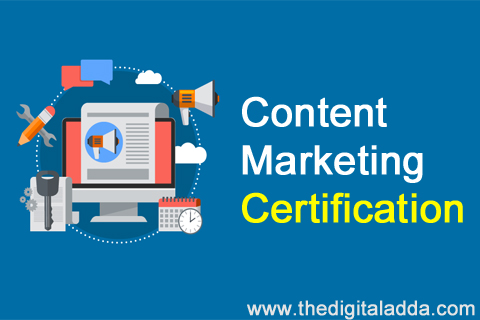Content Marketing FREE Certification – The Digital Adda
Content marketing is a digital marketing strategy that revolves around the creation, distribution, and promotion of valuable and relevant content to attract and engage a target audience. The goal of content marketing is to provide information, answer questions, solve problems, and ultimately build trust and brand loyalty with the audience. Here are key components and best practices of content marketing:
1. Audience Understanding:
- Start by identifying your target audience and creating detailed buyer personas. Understand their needs, preferences, pain points, and behaviors to create content that resonates with them.
2. Content Strategy:
- Develop a comprehensive content strategy that outlines your goals, target audience, content types, publishing schedule, and distribution channels.
- Define key performance indicators (KPIs) to measure the success of your content marketing efforts.
3. Content Creation:
- Create high-quality, informative, and valuable content that addresses the needs and interests of your audience. Content can include blog posts, articles, videos, infographics, podcasts, ebooks, whitepapers, and more.
- Use a consistent tone and brand voice in your content to maintain brand identity.
4. SEO (Search Engine Optimization):
- Optimize your content for search engines to increase its visibility and ranking in search results. This includes keyword research, on-page optimization, and creating SEO-friendly URLs and meta tags.
5. Content Distribution:
- Promote your content across various channels, including your website, blog, social media, email marketing, and content syndication platforms.
- Leverage social media marketing, email newsletters, and paid advertising to expand your content’s reach.
6. Engagement and Interactivity:
- Encourage engagement by enabling comments on blog posts, social media sharing, and responding to comments and inquiries.
- Create interactive content such as quizzes, polls, surveys, and live webinars to engage your audience more deeply.
7. Content Calendar:
- Maintain a content calendar to plan and schedule content publication. Consistency in posting helps keep your audience engaged and informed.
8. Analytics and Measurement:
- Monitor and analyze the performance of your content using tools like Google Analytics, social media analytics, and email marketing metrics.
- Adjust your content strategy based on data insights to optimize results.
9. Content Promotion:
- Actively promote your content through outreach to influencers, email campaigns, guest posting, and social media advertising to reach a wider audience.
10. Evergreen and Timely Content: – Balance evergreen content (timeless and always relevant) with timely content (related to current trends or events) to maintain a diverse content portfolio.
11. Storytelling: – Incorporate storytelling into your content to make it more relatable and emotionally engaging for your audience.
12. User-Generated Content: – Encourage your audience to create and share their content related to your brand or products. User-generated content can build authenticity and trust.
13. Content Repurposing: – Repurpose existing content into different formats (e.g., turning blog posts into videos or infographics) to reach different audience segments and maximize content value.
14. Content Quality and Originality: – Prioritize the quality and originality of your content. Plagiarism and low-quality content can harm your brand’s reputation.
15. Content Feedback: – Collect feedback from your audience through surveys, comments, and reviews to understand their preferences and improve your content strategy.
Content marketing is a long-term strategy that requires consistency, patience, and ongoing optimization. By creating valuable content that addresses the needs and interests of your target audience, you can build a strong online presence, establish authority in your industry, and ultimately drive conversions and customer loyalty.
Content Marketing FREE Online Course with Certificate
